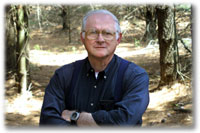Friday, June 14, 2019
Haymaking Breakthrough
Pa bought our first side-delivery rake back in about 1947. It was an important technological breakthrough. Haymaking was hard work. Now it would be easier.
Before the side-delivery rake, we made hay like this. First Pa cut the hay with our five-foot McCormick mower pulled by our trusty team of horses. Once the hay was cut and dried for a day or so, depending on the weather and lack of rain, he raked the hay with a dump rake, a distant cousin of our new side-delivery rake.
Once the hay was raked, my brothers, Pa and I piled the hay into little bunches—sort of like overgrown cupcakes that soon appeared across the field. After another drying period, a day or so, we pitched the hay bunches on to our steel-wheeled hay wagon, and hauled it to the barn.
Arriving at the barn, we pitched the hay, into the hay mow, by hand. With three-tined forks. All of this was before 1945, when Pa bought our first tractor. And soon after a side-delivery rake and a hay loader.
Haymaking became easier. Once the hay was cut, now with a tractor-pulled mower pulled by the tractor, the hay was raked in long ropes with the side-delivery rake. No more bunching hay by hand. The tractor pulled the hay wagon—we now had one with rubber tires. A mechanical hay loader was attached to the back of the wagon. which automatically loaded the hay onto the wagon. What could be easier?
THE OLD-TIMER SAYS: Learn to appreciate the things that make life easier.
ANNOUNCEMENT: My “Telling Your Story” Writing Class at The Clearing in Door County is set for July 19, 9-4. Call 920-854-4880 if you are interested in attending. The class usually fills, so you may want to reserve a spot sooner than later.
UPCOMING EVENTS:
July 12, 6:00 p.m. Frank B. Koller, Memorial Library, 2 US-51, Manitowish Waters. Old Farm Country Cookbook, with co-author, Susan Apps-Bodilly.
BOOKS FOR SUMMER READING;
Want a book to read this summer? Here are two more of my novels for your consideration.
Each deals with a contemporary rural issue. Purchase from your local bookstore, or buy them from the Friends of the Patterson Memorial Library in Wild Rose—a fundraiser for them. Phone: 920-622-3835 for prices and ordering.
Patterson Memorial Library
500 Division Street
Wild Rose, WI 54984
barnard@wildroselibrary.
www.wildroselibrary.org
Cranberry Red
From Booklist:
In the fourth book in the Ames County series, Ben Wesley, an agricultural agent for the past two decades, is suddenly out of work when funding for his program is cut. He’s immediately offered a job with Osborne University, doing pretty much what he did before but charging people for his services. This makes him a little uncomfortable but not nearly as much as Cranberry Red, a new chemical developed by the university’s researchers that could have spectacular benefits for people with heart disease or Alzheimer’s. When it begins to appear that Cranberry Red has some pretty nasty side effects, Ben is faced with a difficult choice: keep his job and find a way to protect the community, or blow the lid off the secret and risk everything. Apps approaches his familiar themes (honor, the importance of community, the increasing threat to traditional farming) from a new angle, focusing on the issue of genetic modification and its impact on an entire way of life. As usual, he creates compelling characters and places them in a vividly realized setting. –David Pitt
Tamarack River Ghost
When journalist Josh Wittmore moves from the Illinois Bureau of Farm Country News to the newspaper’s national office in Wisconsin, he encounters the biggest story of his young career—just as the paper’s finances may lead to its closure.
Josh’s big story is a corporation plans to establish an enormous hog farm that bought a lot of land along the Tamarack River in bucolic Ames County. Some of the local residents and officials are excited about the jobs and tax revenues that the big farm will bring, while others worry about truck traffic, porcine aromas, and manure runoff polluting the river. And how would the arrival of a large agribusiness affect life and traditions in this tightly knit rural community of family farmers? Josh strives to provide impartial agricultural reporting, even as his newspaper is replaced by a new Internet-only version owned by a former New York investment banker. And it seems that there may be another force in play: the vengeful ghost of a drowned logger who locals say haunts the valley of the Tamarack River.
Subscribe to:
Post Comments (Atom)


No comments:
Post a Comment